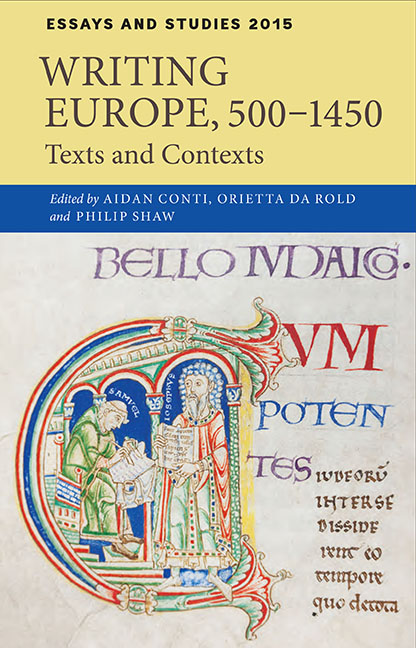Book contents
- Frontmatter
- Contents
- List of Illustrations
- Notes on Contributors
- Preface
- Acknowledgments
- List of Abbreviations
- Medieval Manuscript Studies: A European Perspective
- The DigiPal Project for European Scripts and Decorations
- Italian Giant Bibles: The Circulation and Use of the Book at the Time of the Ecclesiastical Reform in the Eleventh and Twelfth Centuries
- Isolation or Network: Arengas and Colophon Verse in Frisian Manuscripts around 1300
- Writing the Germanic Languages: The Early History of the Digraphs
, and The New Heathens: Anti-Jewish Hostility in Early English LiteratureLatin Composition in Medieval NorwayTranslating Europe in Medieval WalesCharms among the Chants: Verbal Magic in Medieval Bulgarian ManuscriptsIndexThe New Heathens: Anti-Jewish Hostility in Early English Literature
Published online by Cambridge University Press: 11 June 2021
Book contents- Frontmatter
- Contents
- List of Illustrations
- Notes on Contributors
- Preface
- Acknowledgments
- List of Abbreviations
- Medieval Manuscript Studies: A European Perspective
- The DigiPal Project for European Scripts and Decorations
- Italian Giant Bibles: The Circulation and Use of the Book at the Time of the Ecclesiastical Reform in the Eleventh and Twelfth Centuries
- Isolation or Network: Arengas and Colophon Verse in Frisian Manuscripts around 1300
- Writing the Germanic Languages: The Early History of the Digraphs , and
- The New Heathens: Anti-Jewish Hostility in Early English Literature
- Latin Composition in Medieval Norway
- Translating Europe in Medieval Wales
- Charms among the Chants: Verbal Magic in Medieval Bulgarian Manuscripts
- Index
Summary
THE ELEVENTH AND twelfth centuries were a transformative period for English literary culture. Consecutive waves of immigration after the Danish and Norman conquests created new audiences for writing in Old Norse, French and Latin, diverting patronage away from Old English. After the death of Archbishop Wulfstan of York in 1023, English works were no longer composed in significant quantities by a single author. Instead, Benedictine monks, based principally in cathedral priories, edited and updated the existing homiletic corpus for a new generation, supplementing it with a thin stream of original translations. The last texts copied in Old English overlap with the earliest works in Middle English, which were composed in the second half of the twelfth century and anthologised at the beginning of the thirteenth. Between the two invasions (1016 and 1066), England began to integrate more tightly into a common northwestern European cultural zone and experienced the first stirrings of the so-called ‘twelfth-century renaissance’. One of the many changes associated with this accelerated period of renewal was a sharp increase in hostility towards the Jews.
The following discussion focuses on references to the Jews as the ‘heathen’ in English pastoral and historical texts from the twelfth century. This usage (and concept) was not current in the Anglo-Saxon period and first appears after the Norman Conquest. There is no reliable evidence that the Jews settled in England or had any sustained form of contact with the English before 1066. When the Anglo-Saxons wrote about the Jews or represented them in art, they were piecing together an image of the Jew from their reading of the Bible, Late Antique historical works, and patristic commentaries. The first Jewish settlers migrated to England from Rouen with William the Conqueror, who employed them as money changers and exploited their trade links with the Rhineland. As the twelfth century progressed, the Jews established communities in many provincial cities under the special protection of the Crown. The settlement of the Jews in England coincides with a rise in anti-Jewish hostility across western Europe; the onset of the crusades in 1095, the foundation of secular schools, the growth of a credit-based economy, and the increasing popularity of affective modes of devotion coalesced to create new and more aggressive forms of anti-Jewish resentment.
- Type
- Chapter
- Information
- Writing Europe, 500-1450Texts and Contexts, pp. 123 - 146Publisher: Boydell & BrewerPrint publication year: 2015
Save book to Kindle
To save this book to your Kindle, first ensure coreplatform@cambridge.org is added to your Approved Personal Document E-mail List under your Personal Document Settings on the Manage Your Content and Devices page of your Amazon account. Then enter the ‘name’ part of your Kindle email address below. Find out more about saving to your Kindle.
Note you can select to save to either the @free.kindle.com or @kindle.com variations. ‘@free.kindle.com’ emails are free but can only be saved to your device when it is connected to wi-fi. ‘@kindle.com’ emails can be delivered even when you are not connected to wi-fi, but note that service fees apply.
Find out more about the Kindle Personal Document Service.
- The New Heathens: Anti-Jewish Hostility in Early English Literature
-
- Book: Writing Europe, 500-1450
- Online publication: 11 June 2021
×Save book to Dropbox
To save content items to your account, please confirm that you agree to abide by our usage policies. If this is the first time you use this feature, you will be asked to authorise Cambridge Core to connect with your account. Find out more about saving content to Dropbox.
- The New Heathens: Anti-Jewish Hostility in Early English Literature
-
- Book: Writing Europe, 500-1450
- Online publication: 11 June 2021
×Save book to Google Drive
To save content items to your account, please confirm that you agree to abide by our usage policies. If this is the first time you use this feature, you will be asked to authorise Cambridge Core to connect with your account. Find out more about saving content to Google Drive.
- The New Heathens: Anti-Jewish Hostility in Early English Literature
-
- Book: Writing Europe, 500-1450
- Online publication: 11 June 2021
×

